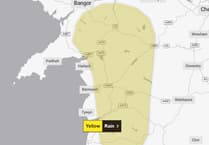A FRESH pollution alert has been issued at an Aberystwyth beach amid others along the Cardigan Bay coastline as the summer holidays begin.
Data released from Wales’s primary water supplier Dŵr Cymru and environmental regulator Natural Resources Wales (NRW) revealed a concerning record of discharges across the region’s seas, rivers and waterways last year.
But with the school holidays upon us, residents and visitors will be concerned to know which areas of Ceredigion – heavily reliant on tourism – will have clean bathing spots.
The latest alert from environmental charity Surfers Against Sewage (SAS) is at Aberystwyth South beach and was issued yesterday (24 July) by NRW – and there has been one reported sickness.
There is also an NRW alert in place further up the coastline in Aberdyfi, just across the estuary from Ceredigion village Borth. There have been two reported sicknesses at the beach in recent weeks and multiple pollution alerts.
The Cambrian News has contacted NRW for more information about the latest pollution alerts.
Earlier this month, NRW raised the alarm at Llangrannog beach on Friday, 14 July. Dr Carol Fielding, Ceredigion Environment Team Leader for NRW, said: “We have issued alerts that there is a risk of reduced water quality at Llangrannog and New Quay North due to heavy rain. Heavy rain can wash pollutants into rivers, and this can reduce bathing water quality. These alerts are precautionary in nature and are based on recent weather conditions and modelling of the area. They are not based on the analysis of any recent sampling of the bathing water."
A little further up Cardigan Bay on Llanrhystud beach, a sewage pollution alert was issued by SAS. It said: “There has been a sewage discharge at Llanrhystud which started on 11 July at 12.55pm. Welsh Water is responsible for this discharge.” Today it has updated and states that NRW has also issued its own alert.
A Dŵr Cymru spokesperson said: “Following heavy rain in the Llanrhystud area our storm overflow operated as designed. We have permission from our regulator, Natural Resources Wales, to operate the overflow in such weather conditions. We would like to apologise for any inconvenience caused to anyone when the overflow operated.”
On Monday, 10 July, NRW issued a pollution risk alert at Aberdyfi – across the Dyfi estuary from tourism hotspots Ynyslas and Borth. The alert read: “Please be aware there is a situation at this location.”
An NRW spokesperson said monitoring noted an elevated level of bacteria in the area which was caused by suspected sheep faeces on the beach after heavy rain, high tides and the grazing of nearby saltmarsh by livestock.
But as yet there have been no suspected sewage discharges captured along the northern stretch of Cardigan Bay – despite accusations by Tywyn residents about discharging from the town’s wastewater treatment works.
An NRW spokesperson said: “We issue pollution risk forecasts daily from May to September, and are valid for 24 hours. Not all designated bathing waters receive pollution risk forecasts. Four Ceredigion beaches receive can receive these alerts (They are Aberystwyth South, Llangrannog, New Quay North and Traeth Gwyn, near New Quay). Llanrhystud is not one of these beaches and would therefore not have an alert issued for it. We have not received any report of a pollution incident in the Llanrhystud area, so we have no reason to believe that the water quality would be lower than expected.”
The private water sector refers to discharge drains as combined storm overflows (CSOs) and warns that sewage flooding and damage to homes would occur without them – especially during periods of extreme weather.
Last year, New Quay in south Ceredigion saw 1,800 hours (up nearly 400) from 138 separate incidents – the fifth most sewage overflow of any beach in Wales. Aberystwyth South saw 1,500 hours from 200 dumps.
When it comes to spills, the Cwrtnewydd sewage treatment works storm overflow, leading into the Nant Cledlyn, saw 366 dumps which equate to 4,280 hours. It was followed by the Cardigan wastewater treatment works CSO drain which leads into the highly polluted River Teifi where there were 298 spills which combined amounted to 2,801 hours of overflow. Drains in Lampeter, Llanfarian, Tregaron and Llanybydder also saw 1,500 or more hours of discharge.

.png?width=209&height=140&crop=209:145,smart&quality=75)


-the-UKs-leading-biennial-exhibition.png?width=209&height=140&crop=209:145,smart&quality=75)
Comments
This article has no comments yet. Be the first to leave a comment.